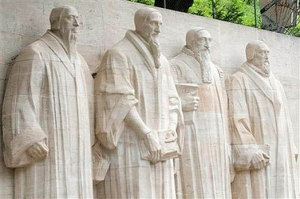Solomon on how to deal with oppressive elites

The Bible has several stories about ending evil, oppressive regimes. Pharaoh in the Exodus is the most well-known tale of God liberating slaves and judging a tyrant. But it is not the only one. After Solomon became unfaithful to the Lord, God allowed a tax revolt to remove most of Israel from the authority of Solomon’s heir, Rehoboam. Judges is all about God raising up leaders from the Israelite population to overthrow foreign rulers. Saul was chosen to be king because the people wanted a leader to fight against foreign powers ruling over the country.
But there was virtually always a reckoning after these revolutions. The liberated Hebrew slaves were constantly complaining against Moses (keep in mind that “complaining” sometimes got to the point of threatening his life). Rehoboam, the popularly chosen king who led the majority of Israel to be independent of Solomon’s dynasty, was not a faithful king. And subsequent rulers of Israel were much worse. After the judges delivered them, the people returned to the behavior that led them to be conquered in the first place. Sometimes, the judges themselves were the source of the trouble (Gideon was a champion for the Israelites but he had a son who ended up causing mayhem; see Judges 8:22-9:57).
While oppressive rulers are bad, overthrowing them doesn’t always lead anywhere good. David, though anointed by God to replace Saul as king, refused to kill him or even try to overthrow him by force. He realized that ruling by regicide would set a precedent that would not be forgotten and would not bode well for a stable regime.
Perhaps reflecting on David’s life, Proverbs 24:21 states, “My son, fear the LORD and the king, and do not join with those who do otherwise” (ESV). There are some translation debates about the latter part of the verse. The NASB says, “Do not associate with those who are given to change” and the NIV reads, “and do not join with rebellious officials.” Whatever the exact nuance of the second part of the proverb, the basic message is clear. It is even closely paraphrased by the Apostle Peter in his first letter: “Honor everyone. Love the brotherhood. Fear God. Honor the king.” (2:17).
So if God does sometime approve of overturning those in power, yet it so often ends badly, what should we do?
As a matter of historical record, the Apostles and other evangelists founded churches that functioned as a new culture. And as that culture matured and spread, the entire political and social situation in the Mediterranean world was transformed. New people provided new leadership by replacing, converting, or otherwise influencing rulers.
Which is what you would expect a religion to do that regards Proverbs as part of divine revelation.
- “A servant who deals wisely will rule over a son who acts shamefully and will share the inheritance as one of the brothers” (Proverbs 17:2 ESV).
- “Whoever troubles his own household will inherit the wind, and the fool will be servant to the wise of heart” (Proverbs 11:29 ESV).
- “A rich man is wise in his own eyes, but a poor man who has understanding will find him out” (Proverbs 28:11 ESV)
Christians ended up inheriting Western civilization by learning and living (however imperfectly) God’s wisdom. Within three centuries they ended up in charge.
So when dealing with oppressive elites, it might be better to think of God as searching for reliable replacements, rather than merely wanting to end the evil regime. If God is thinking “long term,” He is not going to overthrow a government just to see it replaced with a worse one. He wants a better government to take the place of the one he wants to overthrow.
What that means is that God is going to look for an available group of people who can reliably govern.
What kind of people will God look for?
- Will he choose people who think that the world needs them to be in control because they alone are right?
- Will he choose people who can’t tolerate opposition?
- Will he choose people who respond to adversaries by lashing out?
- Will he choose people who long to destroy all their enemies?
Look at it this way: Either the world is changed by God in his providence or he has left us alone to save ourselves. If the latter is true, then the qualities of a good ruler will be whatever are best suited to take power by any means necessary. Otherwise, he cannot ever gain power. But that’s not the Christian view.
If God gives authority to those he wants to have it, then other considerations should be important. If one wants to be put in power by God, one must develop the will and skill to use power in a way that God commends.
“Well done, good and faithful servant. You have been faithful over a little; I will set you over much. Enter into the joy of your master.”
Matthew 25:23
In that case, gaining more power is not your primary responsibility. Overthrowing oppressive rulers is not your responsibility. Your responsibility is learning to do well with what little power you already have.
Most people, when they have little power or wealth of responsibility of significance, tell themselves that their habits and speech don’t matter that much. But the Bible says differently.
“One who is faithful in a very little is also faithful in much, and one who is dishonest in a very little is also dishonest in much."
Luke 16:10
Won’t God prefer people who are cheerful in adversity, humble about themselves, with a zeal for justice and an ability to extend mercy, be tolerant, and show prudence?
Be the government you want to see in the world, by how you govern yourself and your own affairs.
Mark Horne has served as a pastor and worked as a writer. He is the author of The Victory According To Mark: An Exposition of the Second Gospel, Why Baptize Babies?,J. R. R. Tolkien, and Solomon Says: Directives for Young Men. He is the Executive Director of Logo Sapiens Communications and the writer for SolomonSays.net.





























